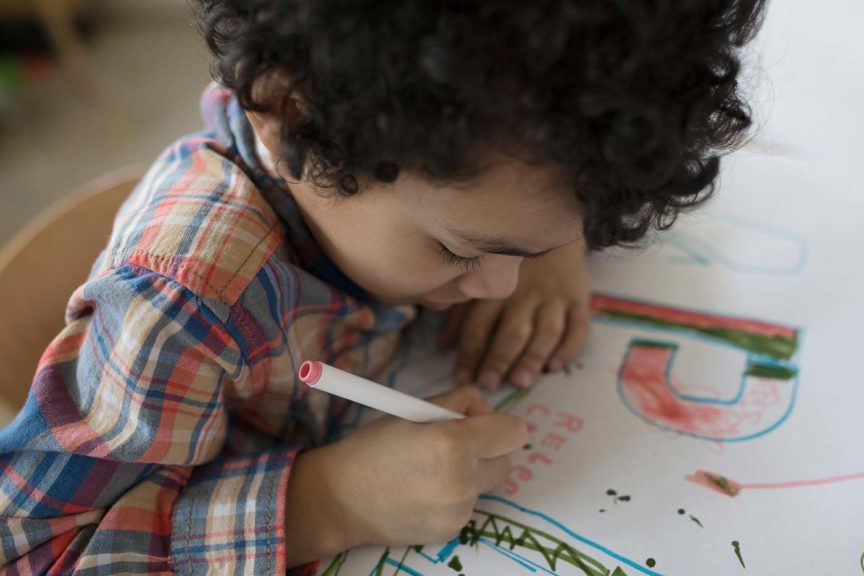THE BASICS FOR LEADERS
Supplies
Introduction
Waiting . . . That’s something most of us don’t do well.
To be fair, we’re trained to not wait. We eat fast food, get fast answers from the Internet, move around in fast cars. We’ve forgotten how to wait.
Which means that when someone makes us a promise—we expect fast results. But when that promise comes from God, fast results aren’t always part of the deal.
Just ask Abram.
God promised Abram that he’d move to a new land, have a child, and through Abram the world would be blessed. The move happened quickly. The child took 25 years.
And that big blessing? Another 40 generations, give or take.
God always keeps his promises. That’s good news because God has made some promises to you too. As you experience this session with your kids, you’ll have the chance to think about some of those promises.
You’ll also have the chance to consider whether you really trust God to deliver on his awesome promises. Because if we take God at his word—really take him at his word—that changes how we live.
That was true for Abram . . . and it’s true for you.
OPENING ACTIVITY
Option 1: Howzitgoin’

Supplies
- Pencils
- Prepared poster
Before kids arrive, draw a line on a poster. Place a 1 on the left end of the line, a 10 on the right, and a 5 in the middle. As kids arrive, ask them to pencil in their initials on the line.
Say: If this past week was so awful you wish you’d slept through it, place your initials by the 1. If it was a great week that you wish you could repeat, put your initials by the 10.
Place your initials anywhere on the line that shows how you feel about this past week—except exactly on the 5. That’s because there’s no such thing as a week that’s exactly half good and half bad!
After kids have signed in, give them 30 seconds each to explain why they placed their initials where they did. Be sure to include your own initials and explain your placement on the line. Kids will begin to express themselves more over time—and hearing their stories will help you adapt this lesson to make it relevant to your kids’ lives.
Option 2: Sloooooow Mail
Supplies
- Pencils
- Paper
- Envelopes (1 per child)
Have children get in groups of two. Give each child a sheet of paper and an envelope. Say: You’ll write a note to your partner. Please sit where your partner can’t read what you’re writing.
Tell children to write encouraging, positive notes. For instance, they might describe what they like about their partner, or promise to pray for their partner.
Give children two minutes to write. Then ask kids to fold their notes, seal their notes in envelopes, and write their partners’ names on the outside of their envelopes.
Have children join you in a circle. Ask partners to exchange envelopes–but not to open those envelopes.
Say: I’ll write “Do not open until (give kids a date six months away)” on your envelopes. (Do so.) Hold your envelopes as we talk.
As a group discuss:
- What’s making it easy or hard to wait to read your note?
Say: Waiting can be hard, can’t it? That’s especially true with promises. If I promised you an amazingly cool gift on your birthday, you’d want your birthday to be tomorrow!
One time when it was hard for me to wait for a promise to be kept was . . . Briefly share about a time you had to wait for a promise to be kept. Maybe your parents promised you a trip to Disney World, or you planned your wedding and looked forward to your wedding day. Sharing your story models what sort of story you’d like your kids to share. It also helps them get to know you better.
Say: Your turn now. Tell about a time it was hard for you to wait for a promise to be kept. Tell what the promise was and how it felt to wait.
Allow time for kids to share their stories. Then thank kids for sharing.
Say: Today we’ll meet someone who had to wait for promises to be kept. God made those promises to a man named Abram. Abram had to decide if he trusted God to keep his promises or not. And good news: God kept his promises to Abram . . . and God will keep his promises to you.


AWESOME PROMISE GAME
Ice Cold Questions
Supplies
- Ice cubes (1 per child)
- Paper towels
- Bowl
Dive In
Ask children to sit on the floor in a circle. Say: I promise you, it’s going to feel better. If you’re wondering what I mean, I’ll show you.
Give each child an ice cube. Say: Hold your cube in one hand—and no switching hands. Hold your ice cube as we talk about a few things. And I promise—your hand will feel better . . . sometime. Trust me!
As a group (and while everyone holds the cubes) discuss the following—as long as possible but not until the kids are really hurting:
- A man named Abram moved from one country to another. If you moved to a new country, what would you miss about this one?
- If you were to move today, what’s something you have that you’d want to be sure you took with you? Why?
- If you’ve ever moved, tell about that. How long until you felt at home in your new neighborhood?
Thank kids for sharing and give each child a paper towel. Collect melting ice cubes in the bowl and encourage kids to warm their hands.
Keep It Going
Say: I told you you’d feel better! Promise kept—just not as quickly as you might have liked.
Life can be like holding an ice cube. Sometimes life is “cold”—people treat us badly; life’s not fair. Sometimes life is hard—we have problems. But things will get better. Many things get better right away. But things will get better someday for sure! I know that’s true because God promised that if we know and love Jesus, someday we’ll be with him in Heaven. And God keeps his promises—always.
Here are some awesome promises God has made to you.
Read the following passages aloud. Or even better, if you have confident readers in your group, ask children to read the passages aloud. Be sure to emphasize the points in parentheses.
- Matthew 11:28, 29 (In Jesus you’ll find comfort and rest.)
- Romans 8:37-39 (Nothing can separate us from God’s love.)
- Romans 10:9 (You can be saved from sin.)
- 1 John 1:9 (You can be forgiven.)
- John 14:3 (Jesus has a place for you in Heaven.)
- Revelation 21:3, 4 (Heaven is a place of joy—forever.)
Say: Those are all promises God has made—to you. God made promises to Abram too. Let’s see what those promises were and how God kept them.
PROMISE KEPT BIBLE STORY
Do the Math
Supplies
- Bible
- Paper
- Pencils
Ask kids to join you in forming a circle, seated on the floor. Give each child a sheet of paper and a pencil.
Say: Math quiz! Please figure out the answer to this question: How long did it take God to keep his promises to Abram?
To figure that out, you’ll need to know what promises God made and how much time passed between when God made the promises and when God kept them.
Use your pencil and paper to take notes as I read passages from the Bible that contain hints. We’ll work together to figure this out.
Read

Read aloud Genesis 12:1-7; 13:14-18; and 21:1-5. As a group discuss:
- What promises did God make to Abram? (to give him a new home, to give him many descendants, to bless the world through him—Genesis 12:2, 3, 7; 13:14-16; 21:1, 2)
- How long did it take God to keep his promises? (new land: not long; having a son: 25 years; see below about blessing the world)
- The “blessing the world” promise was kept when Jesus was born—he came from the family of Abram. But how long did that take? Any ideas?
Give kids a chance to answer. Say: We can get closer to figuring it out by looking at the book of Matthew, chapter 1. Matthew lists 42 generations between Abram and Jesus.
Keep Going!
Show kids the chapter in the Bible. Say: I won’t read this out loud, because the names are way hard to pronounce—like Zerubbabel! But think about it: God promised Abram that the world would be blessed through him—through his family. That happened when his grandson was born. Wait . . . not grandson. Great-grandson. Actually . . .
Say the word great 42 times, counting on your fingers, and then say grandson.
If each generation was 30 years, how long would that be? 42 x 30 = 1,260 years! That’s a long time to wait for a promise to be kept—and it may have been longer. We don’t know exactly.
When we’re waiting for a promise to be kept, it’s easier if we trust the person who made the promise.
As a group discuss:
- What makes it easy for you to trust God?
- What makes it hard to trust God?
- Would anything make it even easier for you to trust God?
Say: I’m glad God always keeps his promises, even if I have to wait. Sometimes waiting for God helps me trust him more. I remember that God is in charge, and I’m not!
CLOSING PRAYER
Patience Prayer
Ask kids to join you in standing in a circle. Say: You have a friend who always keeps his promises. That friend is God. Let’s take a few minutes to thank God for being so faithful. And let’s thank God for those things he’s promised us—because he will deliver! He’ll keep his promises.
I’ll mention a promise of God and then pause. Please thank God for his promise as I pause, and then I’ll go on to the next one. You can pray out loud or quietly.
Pray: God, thank you for loving us. (pause) Thank you for saving us from sin. (pause) Thank you for forgiving us when we sin. (pause) Thank you for always keeping your promises. (pause) Thank you for your promise that we can be with you forever in Heaven. (pause) In Jesus’ name, amen.
EXTRA TIME ACTIVITY
Option 1: Silly Walk Central
Ask kids to line up against one wall, facing the opposite wall. Say: Abram and his family walked to their new home. Let’s see how many ways you can walk.
Ask kids to walk in a variety of ways, each time from wall to wall. (Suggestions: baby steps, giant steps, on tiptoe, like ice-skaters, running, hopping, like kangaroos “walk,” like snakes “walk,” like chickens walk.)
Have kids sit again and discuss:
- What was your favorite walk—and why?
- Abram was walking to a new home. Show the rest of us how you’d walk if you were walking to a new home.
Say: Maybe Abram walked quickly with a spring in his step—he was sure God would keep his promise. Maybe, as Abram walked, he looked back over his shoulder sometimes because he missed his old home.
Either way, he kept going. Abram trusted God’s promise. We can trust God too. God always keeps his promises—even if we have to wait awhile.
Option 2: Count Off
Ask kids to stand in random spots around the room (not touching each other) and to close their eyes. Tell them that the goal is for them, as a group, to count aloud from one to ten. The kids will call out numbers—”one,” “two,” and so forth until someone says “ten.”
It seems simple, but they have to make it from one to ten without two kids calling out a number at the same time, or calling out the same number twice. If that happens, the group must start over.
The rules: no peeking and no planning!
Discuss
When kids finish (and this could take a few minutes!) discuss:
- How did you feel while doing this game? Why?
- You didn’t know how long it would take to finish this game. Do you like not knowing when things will happen, or do you like to plan ahead?
- God keeps his promises—but he doesn’t tell us when he’ll keep all of them. If you could know when God would keep just one of his promises to you, which would you choose—and why?
Option 3: Inquiring Minds Want to Know
Gather kids in a circle. Ask: If God loves us, why doesn’t he always keep his promises right away?











